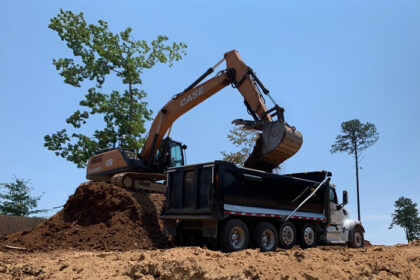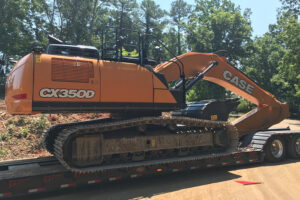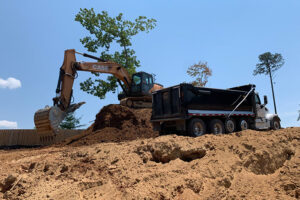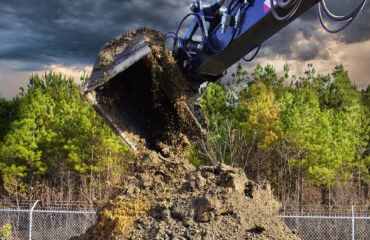
Williams Land Clearing uses earthmovers and attachments to clear a 25-acre tree-filled lot on a subdivision project just outside Raleigh, NC.
For 18 years, Williams Land Clearing has been clearing the way for residential and commercial development across North Carolina. From logging to stumping, from clearing to hauling, Williams is the first team on site and handles it all with the right combination of skilled operators and rugged equipment.
Recently, Williams took on the James Grove subdivision project just outside of Raleigh, NC. It was a 25-acre lot covered in mature pine, poplar and oak trees.
Lamonte Williams rolled onto the site with a fleet of Case excavators equipped with Werk-Brau buckets and stump splitters, and dozers fitted with root rakes. Thanks to the size and maneuverability of the Case equipment, combined with the heavy-duty design of the Werk-Brau buckets, Williams’ crews left behind a clean slate for the development of 200 new homes.
Earthmovers and Attachments Clear the Area
An initial crew logged the timber and the saleable timber was taken off to the mill. A second crew armed with Case 300s fitted with Werk-Brau 54-in. heavy-duty buckets cleared the remaining trees, grubbing them out along with the stumps and root balls left over from the logging process.

To clear the 25-acre wooded site, Williams Land Clearing used a fleet of Case excavators equipped with Werk-Brau buckets and stump splitters, and dozers fitted with root rakes.
Made of high-quality T-1 steel in all critical or high-wear areas, the buckets feature cast cutter bits and a cutting edge backed by heavy reinforcing plate to provide a long service lift in harsh conditions like heavy, clay soils. Straps reinforce the bucket bottom and side wear plates reinforce the sides for added durability and wear life. Industry standard cast cutter teeth easily engaged virgin soil and helped grub out the gnarled stumps and remaining “trash trees” on the James Grove subdivision site.
A Main Pin-Mount Thumb provided 120° of rotation and is specially engineered to handle irregularly shaped objects, like the stumps, root balls and other debris on this jobsite. With multiple tines to secure the materials, the stumps were firmly gripped during handling. The thumb retracts against the excavator stick when not in use, so it does not interfere when using the bucket for loading or grubbing operations.
A Case 1150M dozer equipped with a root rake pushed the trees and stumps into piles, shaking lose root ball dirt in the process. Extra care was taken to eliminate as much dirt as possible before grinding, as Williams strives for quality as well as speed and efficiency in every stage of the process.
A Case 250 excavator equipped with a Rockland stump splitter split the stumps into sizes that could more easily be handled by the Bandit horizontal grinder. For the stumping operation, the excavator was strong enough to efficiently split the stumps, while its maneuverability allowed Williams’ crews to nimbly move between the growing stump piles.
After the material was ground, a final team loaded it onto trucks, again using the Case 300s and Werk-Brau buckets. Whether loading material into off-road trucks for transport around the site or into dump trailers headed to a boiler facility or mulch yard, the buckets are engineered with tapered edges which reduce wear on the sides and allow for easier dumping.
Heavy-duty Tools Hold Up to Tough Work
From stumping to grinding, the Case equipment and Werk-Brau attachments kept the process moving along smoothly and held up well under the challenging work. Previous buckets Williams has used have cracked during use, but the Werk-Brau buckets haven’t developed any signs of premature wear and tear.
In addition to the durability of the buckets, Williams has come to rely on their size. Their 2-cu.-yd. capacity allows them to efficiently handle every task. On the jobsite, the buckets are in constant use, grubbing, loading, piling, and pushing. By using one bucket for all these uses, Williams’ teams are more efficient. Instead of replacing attachments for each phase of the process and hauling around a slew of buckets, operators can move seamlessly from one task to the next. “It means the work never stops,” said Williams.

After the material was ground, a final team loaded it onto trucks using the Case 300 excavators and Werk-Brau buckets.
He added that if a bucket were to crack on site, he couldn’t repair it. Instead, a cracked bucket would have meant a costly repair, both in terms of replacing the equipment and the production downtime to purchase and re-attach a new bucket.
Williams started using the Werk-Brau attachments because they were recommended by his local Case dealer, Hills Machinery. When he saw how the buckets held up on site, he was sold and kept buying them as his fleet grew.
Williams also relies on Hills Machinery to keep his equipment operating at peak capacity. The dealer provides the local service for Williams’ Case ProCare service plan, which includes full-machine factory warranties, planned maintenance contracts and on-site maintenance.
“We thrive off of getting the job done and getting it done fast so it’s cost efficient for the customer,” Williams explained, adding that the 25-acre James Grove subdivision was logged, grubbed, stumped and cleared in four weeks.
See original article here.







